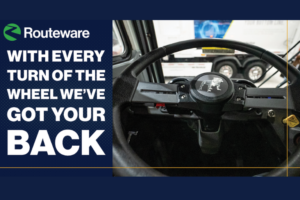In an industry as labor intensive as solid waste and recycling, every bit of efficiency is an opportunity to decrease costs. Municipalities are recognizing that it’s not enough to simply do the same things faster. Technology provides a number of opportunities to not only increase efficiency, but actually provide a higher level of service with options that work better for customers.
Modern waste management teams are implementing demand management strategies that reduce the impact of service requests while at the same time increasing customer satisfaction. Demand management can take many forms, including on-board tools that increase collection accuracy, improved route design, and self-service customer communication channels. The idea is to reduce the need for customers to call with a service request like a missed bin or a recycling question. After all, your customers probably have better things to do, anyway.
Increase efficiency with digital route management
Go-backs from late set-outs or missed bins generate multiple costs, including labor, fuel, and wear-and-tear on trucks and streets. Fleet management software with intuitive in-cab tools helps drivers increase route accuracy. Plus, drivers are in ongoing contact with their home base so they can receive updates on special requests or customer contacts, decreasing costly go-backs.
On-board tools in action: After the City of Grand Rapids, Michigan implemented Routeware’s on-board tools, they were able to reduce go-backs while at the same time completing routes on average 12 percent faster. Drivers have embraced their new in-cab system and their supervisors are using route feedback to provide intelligent coaching for even more efficiency.
Well-planned routes decrease customer concerns
Efficiency starts with planning. Just as cities grow and morph over time, so do solid waste routes. Even if you’re continually tweaking routes the manual way, over time they become unbalanced, leading to inefficiencies. Municipalities and haulers that use route optimization software every six months or even annually are seeing real savings in labor and fuel costs – as well as happier customers. Using EasyRoute from Routeware, waste management teams can balance routes across the entire service area or focus on one area at a time.
Route optimization in action: The City of Lexington, Kentucky optimized more than 90 routes with multiple truck types, equalizing driver workload to decrease significant shift variances. With EasyRoute, the waste management team created new maps quickly and collaboratively, then loaded them into Routeware to guide each driver on their route. The project took just six months — roughly a quarter of what it would have before they had the software.
Self-service tools increase satisfaction at a lower cost
Waste-specific online and app-based tools have the dual benefit of decreasing call center volume while giving customers more flexible service options. Customers increasingly prefer the convenience of searching for their own information or logging an issue from their phone or computer. Self-service options are accessible any time with no need to navigate a phone system or wait in queue. That is, as long as the online tools are task-specific and easy to use. When a customer has a question about their service, they can use the mobile app powered by ReCollect find out what goes where, verify their pickup schedule, or request service. Each time the app is used, that’s a phone call your service center doesn’t have to answer, which saves on resources, shortens queues, and enhances overall service.
Self-service digital tools in action: The City of Austin, Texas has saved almost $200,000 over a three-year period by providing digital recycling education and outreach tools powered by ReCollect. Eighty-five percent of the city’s addresses have been searched for collection information, helping residents make good choices that reduce contamination. The city is well on its way to reaching its goal of reducing the amount of waste it sends to landfills by 90% by 2040.
Waste-specific technology provides dual benefits. Municipalities are increasing efficiency and documenting tangible cost savings while at the same time boosting customer satisfaction and engagement. On the face of it, demand management can be perceived as an effort to push customers into less hands-on service channels. But customers are responding positively to their new options for communication and education: In fact, research shows that most people actually prefer digital interactions with both municipal and commercial service providers. And they have no complaints when their pickups are consistent and flawless.
Learn more. Get a handle on demand with purpose-built tools for waste and recycling. Let’s talk!





